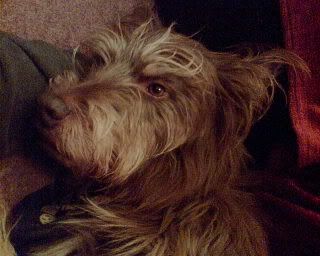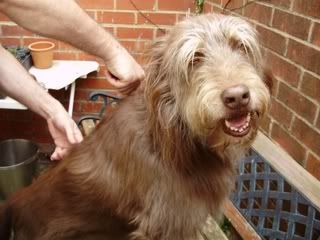Lights Out
…And so one day, the dog woke up and could no longer see. It happened to our dog Binks less than a fortnight ago. One day he could see, the next, the lights went out on him. Just like that. All this happened a day or two after he came back from the pet hospital where he had been operated for a cut on his paw – a minor accident that happened during a walk. We first thought the lethargy was a side effect of the antibiotics he was taking, or the anaesthetic, or the stress of having to wear one of those horrific lamp shade-shaped collars that prevent your dog from chewing off the stitches on its paw.
It was bad news, but in view of the circumstances, it was relatively good. We had been dreading a brain tumour linked to the testicular cancer he had removed only last February, but the doctor thinks the possibility is minimal.
The onset of blindness made Binks fall into deep depression. He was totally apathetic and non-responsive for a full week, eating very little, not interested in playing or going out, even his favourite treats got ignored.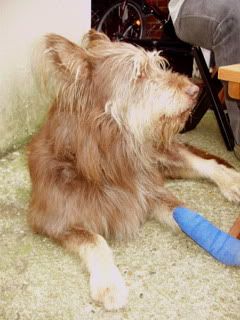
I cannot believe the veterinary world has not as yet invented a more humane way of preventing pets from damaging their own stitches. It is unbearably painful seeing your dog look like a four-legged gramophone, getting stuck in narrow corridors, or on the stairs because the collar is so wide and cumbersome. We tried our best to reduce the amount of time he had to wear it by only putting it on him when we could not personally keep an eye on him – at bedtime or when we had to leave him alone in the house. Even so, we could see the stress showing in his exhausted expression, the heavier breathing, and the constant body shaking. Most nights he had a temperature, and his nose went dry and warm.
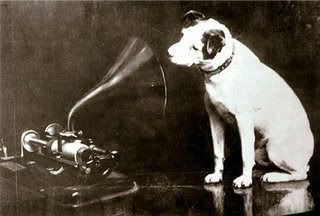
Then came the blindness, and we noticed it as he started bumping into furniture and feeling disorientated in the house even without the collar on.
The ophthalmologist said in 18 years he had been practising, he had only seen twenty-something cases of SARD, so I reckon it is not such a common disease. Then why our dog, I ask? Why? Why? As Binks came to terms with his new world without light, we felt ourselves sinking into deeper and deeper darkness. I could not bear to see him so limp and droopy, as if life didn't interest him anymore. Watching him bang his head on doors, the fridge, the stereo, going round and round, trying to find the exit of the room and not finding it simply broke my heart. His food untouched, his carrot stick rotting uneaten under the table, his toy rat lying forlorn in a corner. This is the dog that only a few weeks ago was playing let's- race-down-the-stairs games with me, swimming in the sea to fetch sticks – his favourite pastime of all (he simply loves the water!) – running along our bikes when we went cycling in the nature reserve. This is the dog that belonged to my other half, and I came to love as if he were my own. I never had a pet as a child, or as an adult, as I never lived anywhere where pets were allowed. When I first moved in with my boyfriend, I didn't know how to walk a dog. I had to learn to control the dog on the lead, instead of "being walked by it". I had to learn to give him commands, bribe him with treats to make him obey me at first. I had to practise holding my breath and scooping up dog poo with a plastic bag. There were plenty of compensations too. The lick-kiss I got in the morning when Binks climbed on the bed to say good morning. The way he started offering me his paws to scratch sat on his bum. The affectionate way he went to sleep with his head resting on my lap.
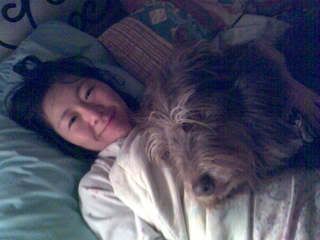
The joy of having a dog is that however much love you give it is returned to you in equal measure. When the lights went out on Binks, it did on us as well. We cried incessantly during the day. At night, we slept badly, waking up whenever we heard him shuffle restlessly round the room. It was one of the saddest weeks in my life. I talked to him as often as I could and told him again and again he would be all right. At night, I cradled his sleepy head in my arms, I stroked his body and visualised a bright white light – the healing energy of the universe – going through my body and into his. I summoned all the healing spirits to use me as a tool to restore health in him. A dearest dog-lover friend in London, had strictly instructed me NOT to cry or show sadness in front of Binks, or he would pick up on it. So when the dog was in the same room as me, I tried to sound cheerful and sing happy songs. I invented ridiculous songs randomly inserting his name in the lyrics. I could see Binks was not finding it funny at all, but I needed to do it - if not for his sake, for my own. But the more upbeat I tried to sound, the more my heart broke inside. I reached the end of the day feeling drained from the effort. The sadness in the house hung low and heavy like a dark cloud before a storm. With the diagnosis, finally came closure. While Binks gradually livens up and goes back to being his old self, we must learn to adapt to living with a blind dog, guiding him round the house, removing any obstacles he could fall over, being patient with him, as everything now takes a bit longer. I need to re-learn to walk him, this time as a blind dog, without feeling so lost and helpless myself. Binks came to rub his face against my leg a few minutes ago and gave me a paw for me to scratch from under the desk. This demand for attention is very familiar behaviour and a clear sign that he is coming out of the depression and back to being his usual spoiled self again. Soon, the vet tells us, we will not even be able to tell he is blind, as dogs use their other senses to compensate for the loss of sight. For Binks the loss was too sudden, and it may be a few months before he is completely comfortable. Had it happened to me, I cannot imagine recovering that fast, if ever, from the shock of losing my sight, but Binks is already wagging his tail again. Animals have an amazing ability to accept the vicissitudes of life with grace and serenity. No matter what tragedy befalls them, they don't resist, or whinge or moan. They simply surrender.
